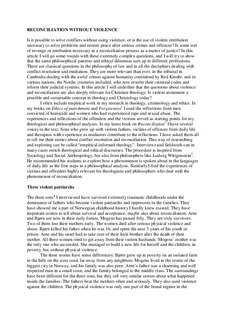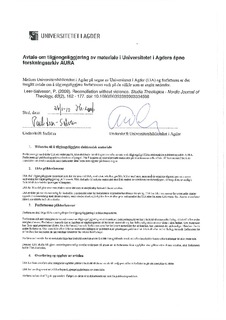| dc.contributor.author | Leer-Salvesen, Paul | |
| dc.date.accessioned | 2010-01-26T15:01:44Z | |
| dc.date.issued | 2009 | |
| dc.identifier.citation | Leer-Salvesen, P. (2009). Reconciliation without violence. Studia Theologica - Nordic Journal of Theology, 63(2), 162 - 177. doi: 10.1080/00393380903334598 | en |
| dc.identifier.issn | 0039-338X | |
| dc.identifier.uri | http://hdl.handle.net/11250/139616 | |
| dc.description | Submitted version of an article published in the journal: Studia Theologica - Nordic Journal of Theology, Taylor & Francis
Published version available at Informaworld:
http://dx.doi.org/10.1080/00393380903334598 | en |
| dc.description.abstract | Is it possible to solve conflicts without using violence, or is the use of violent retribution necessary to solve problems and restore peace after serious crimes and offences? This is a classical question in the philosophy of law and in all the disciplines dealing with conflict resolution. It is also an important question in theology. The material for this article comes from interviews with sons who have grown up with violent fathers, and from philosophical and theological texts dealing with the theme of conflict resolution. In contemporary theology it is necessary to confront images of God as a violent patriarch and punisher, but still it is important to develop a theology of God as the fair and good judge. The God of reconciliation is not only the forgiver, but also the one who confronts Evil with wrath and resentment. | en |
| dc.format.extent | 92401 bytes | |
| dc.format.mimetype | application/pdf | |
| dc.language.iso | eng | en |
| dc.publisher | Taylor & Francis | en |
| dc.title | Reconciliation without violence | en |
| dc.type | Journal article | en |
| dc.type | Peer reviewed | en |
| dc.subject.nsi | VDP::Humanities: 000::Philosophical disciplines: 160::Ethics: 164 | en |
| dc.subject.nsi | VDP::Humanities: 000::Theology and religious science: 150 | en |
| dc.source.pagenumber | 162-177 | en |
| dc.source.volume | 63 | en |
| dc.source.journal | Studia Theologica - Nordic Journal of Theology | en |
| dc.source.issue | 2 | en |

